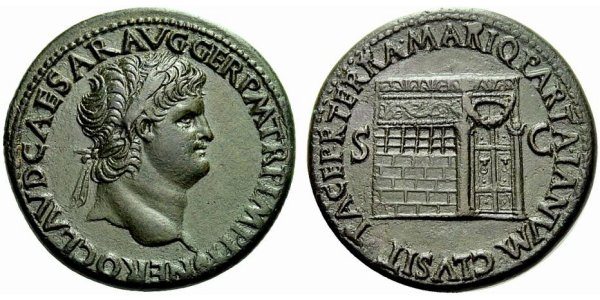
Numismatica Ars Classica NAC AG >Auction >Auction 59 (04.04.2011)
 |
| 写真提供: Numismatica Ars Classica NAC AG
|
 超拡大ボタン 超拡大ボタン |
| |
|
|
|
Numismatica Ars Classica NAC AG >Auction >Auction 59 (04.04.2011)
Lot :926
Price :14000 CHF (~15162 USD)
Description
The Roman Empire
Nero Augustus, 54 - 68
Sestertius circa 65, AE 23.95 g. NERO CLAVD CAESAR AVG GER P M TR P IMP P P Laureate head r., with globe at point of bust. Rev. PACE P R TERRA MARIQ PARTA IANVM CLVSIT S - C View of the temple of Janus, door to r., decorated with garland. C 146. BMC 319. RIC 438. CBN 73.
Struck on full flan and with an exceptionally well detailed reverse. A lovely
dark green patina, about extremely fine / extremely fine
Ex Triton sale XI, 2008, 893.
The Temple dedicated to Janus, the god of beginnings and endings, was one of Rome’s most ancient. The sources indicate it was a rather small temple consisting of two archways with doors that were joined by side-walls. Its location is not known perhaps because the foundation was small enough to have been obscured by subsequent construction.
It was believed that Romulus built the temple after he made peace with the Sabines, and that king Numa decreed its doors should be opened during war and shut during times of peace. Its doors had been closed perhaps five or six times in all Roman history prior to the reign of Nero: under the legendary king Numa (to whom the tradition is traced), at the end of the Second Punic War, three times under Augustus, and, according to Ovid, once under Tiberius.
Thus, when in 65 peace generally had been established on the empire’s fronts, Nero did not hesitate to close the temple’s doors. He marked the event with great celebrations and struck a large and impressive series of coins to document this rare event. The inscription, IANVM CLVSIT PACE P R TERRA MARIQ PARTA, is one of the most instructive on all Roman coins, for it announces “the doors of Janus have been closed after peace has been procured for the Roman People on the land and on the sea”.
In relation to this, Suetonius (Nero 15) describes the visit to Rome of Tiridates, Rome’s candidate for the throne of Armenia. Nero crowned Tiridates, was hailed Imperator and “...after dedicating a laurel-wreath in the Capitol, he closed the double doors of the Temple of Janus, as a sign that all war was at an end.”
Despite Nero’s contentment with affairs on the borders, the year 65 was not happy on the home front as much of Rome was still in ashes from the great fire of the previous year, Nero narrowly survived the Pisonian conspiracy, and not long afterward he kicked to death his pregnant wife Poppaea.
show10goo 無断転用を禁止します。
| 
